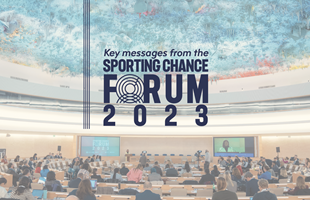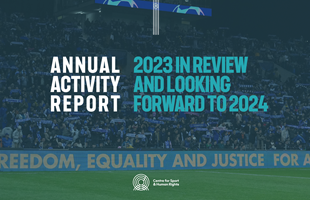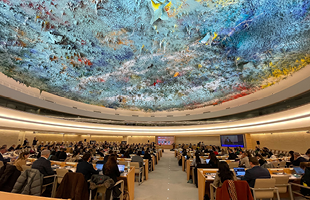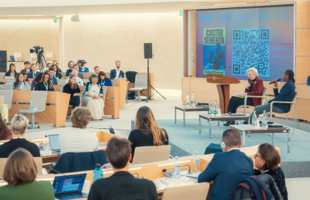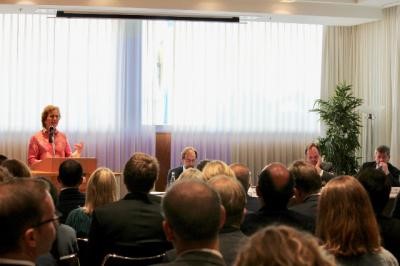
On 26th June 2018, the Centre for Sport and Human Rights was launched in Geneva.
Marking the official launch, the nearly 40 founding members of the Advisory Council of the new Centre were welcomed with remarks by the UN High Commissioner for Human Rights Zeid Ra’ad Al Hussein, the Director-General of the ILO Guy Ryder, and the Centre’s founding Chair Mary Robinson (former President of Ireland and former UN High Commissioner for Human Rights).
Good morning to you all.
I’m happy to see you here today for the official launch of the Centre for Sport and Human Rights and the first meeting of the Centre’s Advisory Council.
Let me begin by expressing my thanks to High Commissioner Zeid Ra'ad Al Hussein and his colleagues from OHCHR for hosting us today, and for working so collaboratively with the other organisations involved to make the new Centre a reality. My thanks as well to ILO Director-General Guy Ryder for his ongoing dedication to this work, and for hosting us later today for an informal gathering at the ILO’s offices to discuss the Centre’s plans with a wider range of colleagues and representatives here in Geneva.
Before turning to our main subject, allow me to take this opportunity to thank you, High Commissioner, for your leadership during your term in this important office. Speaking as someone who knows about the job of High Commissioner from first hand experience, I am grateful to you and your colleagues for being a vital voice and an invaluable resource in advancing human rights around the world. You’ve set an example for us all in these difficult times and have reminded us, as we prepare to mark the Universal Declaration’s 70th anniversary, that human rights belong to us all and are our shared responsibility. The work to protect human rights is never finished. We all must be human rights defenders, and do what we can to make rights a reality for all. I’m sure I speak for everyone here in wishing you only the wind at your back as you approach the finish line in this race you’ve run so well, and as you set your sights on new challenges ahead. But first I hope you’ll be taking a much needed break to catch your breath!
Today we begin a new chapter in advancing our collective mission to make respect for human rights central to the world of sport at every level. Before digging in to our very full agenda, we should take a moment to reflect on the journey we’ve been on together so far.
What began nearly three years ago as an open dialogue between multiple actors involved in, and impacted by, major sporting events, led to the establishment of a multi-stakeholder Platform on Mega-Sporting Events and Human Rights. This has served to build a common framework of engagement and collective action. New organisations have joined us along the way and we’ve reached out to a range of important stakeholders including upcoming hosts of major events in places like Japan and Qatar. I’m pleased that a number of invited guests are with us today to observe our meeting and consider how they might play a role in the future.
We have already shown what can be done to advance the human rights and sport agenda, including by developing new practical resources and by facilitating constructive dialogue. In the months since November, when we were here in Geneva for the second annual Sporting Chance Forum, we’ve kept up the pace of our work and planned for the time ahead. That includes agreeing the initial Strategic Plan for the Centre’s activities focused on sharing knowledge, building capacity and strengthening accountability that we will discuss today. We have agreed that while the new Centre will continue to focus on the human rights challenges and opportunities associated with mega-sporting events, it will also embrace the broader agenda of sport and human rights more generally as we move forward.
I hope we will continue to reflect on how best to integrate more firmly affected groups into both the governance and the activities of the Centre. This is something I care about deeply, particularly in light of all the issues around sport and child safeguarding, gender-based violence, disability and discrimination, which we’ve heard so much about over recent months. So too, we must tackle issues of gender that bisect sport and marginalise LGBTI athletes, and in particular those transgender athletes trying to maintain their vocations. In essence, we need to ensure that the Centre can play a constructive role in addressing the broad range of critical human rights challenges linked to the world of sport. The Centre’s Strategic Plan is moving in this direction and I would encourage us all to think creatively about how a new organisation like the Centre, over time, can contribute to addressing these complex and systemic issues.
During these past months I have challenged you all to launch the Centre as a permanent independent structure that can build on the Platform’s work of encouraging individual and collective actions that advance respect for human rights. Our meeting today will include discussion on how we all plan to further operationalise the 2018 Sporting Chance Principles, and support the work of the Centre as it takes shape.
For my part, I am happy to take on the role of co-Chair of the Centre’s Advisory Council for the next two years,and to be joined by a Co-Chair from the world of sport who will help carry the message of our efforts to new audiences. My hope is that the person who agrees to join me in this role will be on board by the time we meet in Paris on 12-13 December for the third annual Sporting Chance Forum. We are grateful to UNESCO for agreeing to host this year’s event, which is an important moment to take stock of activities underway and address challenges ahead.
One of those challenges is the issue of how the Centre can contribute to strengthening human rights accountability in the world of sport. It is encouraging that you all agree that helping improve access to effective remedy will be an essential part of the work of the Centre. I’m pleased that work is already underway to understand how existing mediation, arbitration and investigative processes are working within the world of sport and how these relate to the broader business and human rights agenda. Our planned event at the Peace Palace in The Hague in October will be an important milestone in reaching greater clarity on these issues and on the best roles for the Centre to play in this area.
Let me conclude by saying that there is great strength in our shared commitment to doing everything possible to ensure that the new Centre takes root and produces positive results. I am grateful to you all for the commitment you’ve demonstrated in getting us to this point. Now our task is to create an organisation that can make real contributions to the world of sport by making the Sporting Chance Principles a reality.
I look forward to our discussions today and to continuing our work together in the months and years ahead. Thank you.

